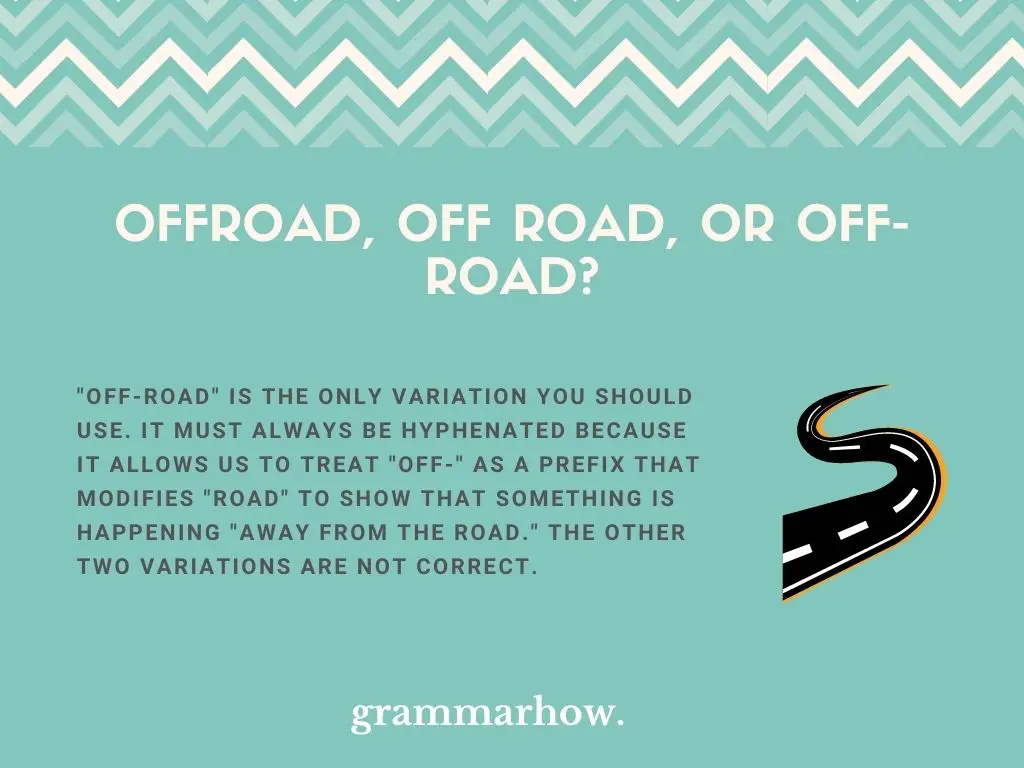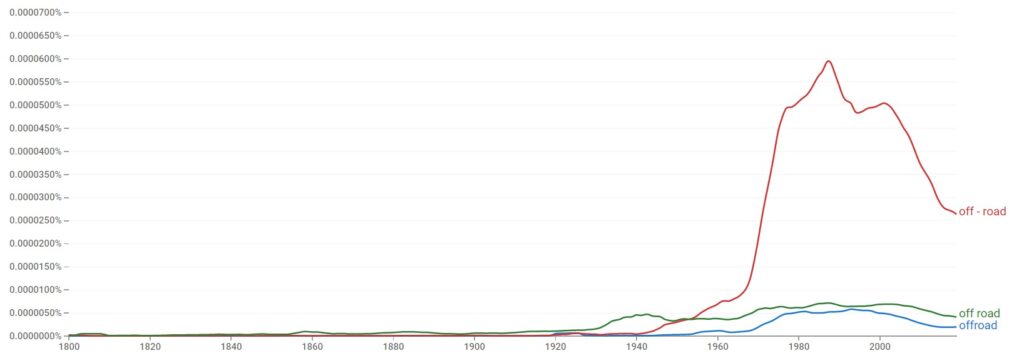When using “off-road” in your writing, it would help to know whether it’s a hyphenated form all the time. Some people think it could work as one or two words, so this article will look into the answer to help you out (and stop you from making silly mistakes).
Off road vs. Off-road vs. Offroad
“Off-road” is the only variation you should use. It must always be hyphenated because it allows us to treat “off-” as a prefix that modifies “road” to show that something is happening “away from the road.” The other two variations are not correct.

According to Google Ngram Viewer, “off-road” is the only acceptable variation and is vastly more popular than the other two. This shows that the hyphen is important. “Offroad” and “off road” see some usage, but this will only be because of grammatical errors or confusion.

In The Cambridge Dictionary and The Oxford Dictionary, “off-road” is the only officially defined word. Therefore, it makes sense that we should only write it in its hyphenated form to make sure we are being grammatically correct.
Neither dictionary mentions “offroad” or “off road” as an alternative, so they must be excluded.
Is “Offroad” One Word?
“Offroad” does not work when combined into one word. We need to keep both “off” and “road” as separate words (linked through a hyphen). This is required because it identifies what the combination of the words is supposed to mean, while “offroad” has no real meaning.
Here are a few examples to clear things up:
- Correct: Would you like to go off-road this time? I think you’re ready for it.
- Incorrect: I can’t handle the offroad parts! Please don’t take me on them again.
- Correct: This off-road malarky is great! Let’s do it more.
- Incorrect: Why do you think it isn’t designed to be offroad?
Is “Off road” Two Words?
You should not write “off road” as two words. The hyphen is important because it helps us to identify that both “off” and “road” combine to modify the same part of the sentence. Keeping them separated will change the meaning of both, which helps nobody.
Here are some examples to show you the difference.
- Correct: Would you like to take this out for an off-road spin with me?
- Incorrect: Off road vehicles are really dangerous. I hope you’ll be careful out there.
- Correct: We don’t like to visit the parts that are off-road. It can be dangerous out there.
- Incorrect: I know an off road shortcut, and I think you’ll really like it!
Is “Off-road” Hyphenated?
“Off-road” makes the most sense when hyphenated. You can treat “off-” as a prefix, where it’s implied that something is happening “away” from the root word (“road”). “Off-” is a prefix where it’s important to maintain the hyphen because it helps to identify the specific meaning.
If we wrote “off road,” it would be assumed that “off” is modifying the word “road.” Therefore, it could refer to anything that happens away from the road. For example, if you are asleep in your house, you are technically “off road.”
However, when using “off-road,” we are keeping more in line with AP Style rules. In the AP Stylebook, it’s common for hyphens to be used to link multiple words together that modify the same noun (which is what “off-road” is mostly used for).
Check these examples out if you’re not sure how to make it work:
- We should take this event off-road to see which of us is the better driver.
- I don’t like traveling off-road! I always find it too bumpy for me!
- It’s not an off-road vehicle, but I really like treating it as such! It can handle a lot.
- This off-road portion is going to get choppy! I hope you have a strong stomach!
Is “Road” Capitalized In The Word “Off-Road”?
There is no real reason to capitalize the second part of the hyphenated form. “Off-road” is not a proper noun, so neither part of the hyphen should be capitalized. The only exception would be starting a sentence with it (in which case, “off” is capitalized).
However, you might find it useful to capitalize both parts of the hyphen if it’s written in a title. After all, if you capitalize every other word in your title, it would look out of place to write “Off-road” rather than “Off-Road.”

Martin holds a Master’s degree in Finance and International Business. He has six years of experience in professional communication with clients, executives, and colleagues. Furthermore, he has teaching experience from Aarhus University. Martin has been featured as an expert in communication and teaching on Forbes and Shopify. Read more about Martin here.

